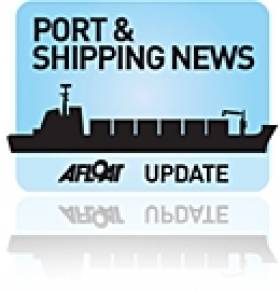Displaying items by tag: Glenn Murphy
Ireland's Glenn Murphy Appointed Chairman of International Shipping Body
The Institute of Chartered Shipbrokers, the professional body for the commercial shipping industry 'worldwide', officially welcomed its new executive leadership team at the Controlling Council meeting in October, writes Jehan Ashmore.
Glenn Murphy FICS will take up the role as Chairman of the Board, having previously been Chairman of the Institute of Chartered Shipbrokers (Ireland) as the Institute provides international support through its 26 branches around the globe.
In this latest new role working alongside Mr Murphy will be Luis Bernat FICS, a former Chairman of the Denmark branch, who takes up the position of Vice Chairman of the Institute.
Glenn is a Chartered Shipbroker and Fellow of the Institute with over 30 years of experience in international shipping, working for both private and public sector bodies. He becomes only the second Irishman to have held this role in the Institutes 120 year history.
He runs his own shipbroking firm based in Dublin and he previously served as a Director of the Marine Institute and also on the Board of the National Maritime College in Ireland. In addition his career included been a Director of the Irish Maritime Development Office (IMDO).
He holds a Masters Degree in Economics & Policy Studies from Trinity College Dublin.
“I am humbled and honoured to have been elected as the Chairman of this remarkable institution. I have spent my entire career working in shipping, and the Institute has always stood for three things to me. Firstly, its pursuit of setting the highest professional standards for Members, followed by an unwavering commitment to educating its students and most importantly its principles of integrity. In an ever-changing and unpredictable world, I believe that these values are even more important.”
Institute Of Chartered Shipbrokers Ireland Elects New Chairman
Glenn Murphy FICS has been elected chairman of the Institute of Chartered Shipbrokers Ireland at its 44th annual general meeting in Dublin last Thursday (25 October).
He replaces outgoing chairman Sean McCabe FICS, who served for the previous two years.
Murphy is managing director of Irish Shipbroking & Chartering Ltd. A fellow of the Institute of Chartered Shipbrokers, he has a Master’s degree in Economics and Policy Studies from Trinity College Dublin.
He was formally director of the Irish Maritime Development Office (IMDO) and chaired a number of expert groups on transport, trade and ports.
Speaking at the AGM, Murphy said: “I am extremely honoured to take on the role in an industry that I have dedicated the last 30 years of my career to.”
Commenting on the priorities for the institute during his term, he said: “The ongoing uncertainty surrounding Brexit presents one of the single greatest challenges to the stability of the sector.
“The Institute of Chartered Shipbrokers in Ireland is an all-island body with practicing members both in the North and South of the island. So many of our members are potentially exposed to major disruption to their day to day business, in particular the companies that are routing vessels and cargo, including transit cargo from outside of the European Union, to and from ports in the United Kingdom.
“We will continue to engage closely with the various stakeholders, including relevant Government departments during this critical phase.”
Discussing the institute’s role in education of its members, Murphy said: “The institute’s internationally recognised professional education and training continues to grow each year. Shipping is generally regarded as a high-risk industry and with the current global economic uncertainty our members and their clients are likely to be tested further.
“Nonetheless I’m confident that given their experience and past training and qualifications in specialist areas such as legal principles and law for carriage of goods by sea, maritime economics and international trade, which includes impacts of tariffs and barriers as well as customs, that I have no doubt our members are well prepared to deal with the challenges ahead whatever they might be.”
Speaking at the ceremony Mr. Murphy commented: "d'Amico Group are one of a leading number of firms that are driving investment in this sector in Ireland which is contributing to new employment and growth opportunities".
Entry of the new dry-bulkers marks another important chapter in the d'Amico Group's development since it established its Irish office in 2002, as the vessels are managed from its Dublin office under the Irish Tonnage Tax (ITT) regime.
Four more newbuilds are under construction in Korea, scheduled for delivery in 2012, and two under construction in Japan which are due in 2013. The latter ships represent a further investment in excess of US $310 million to the Italian company that began and grew as a family business in 1936.
To read more about this logon to the IMDO website and also www.damicoship.com






























































